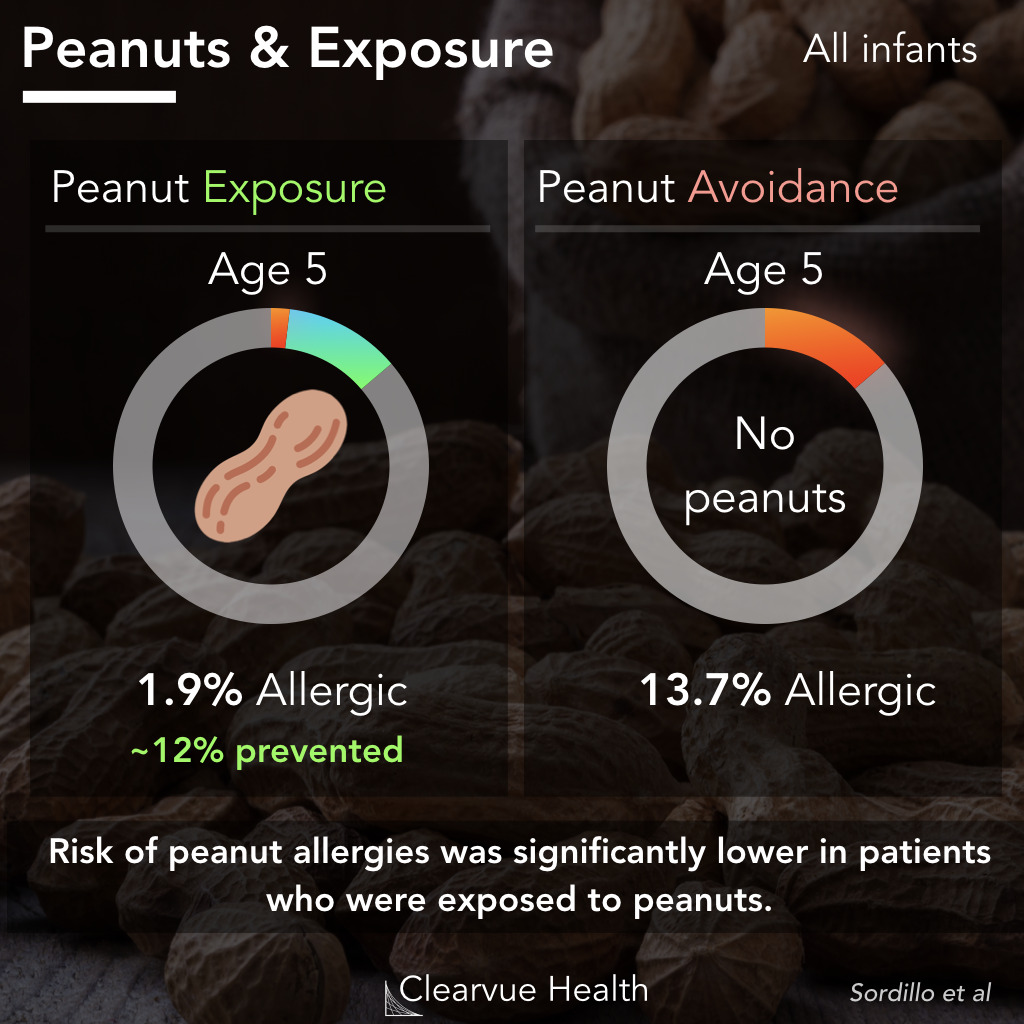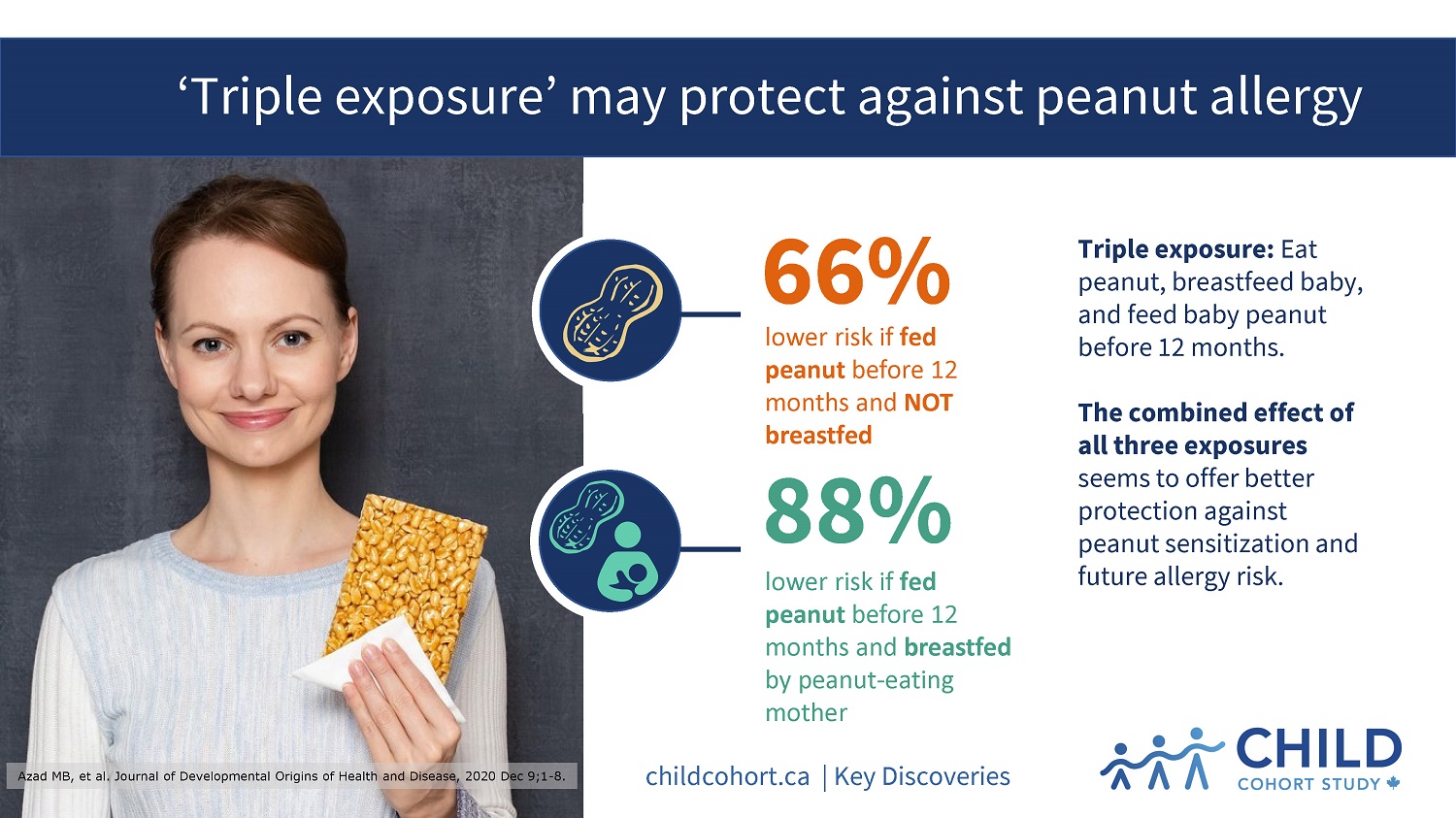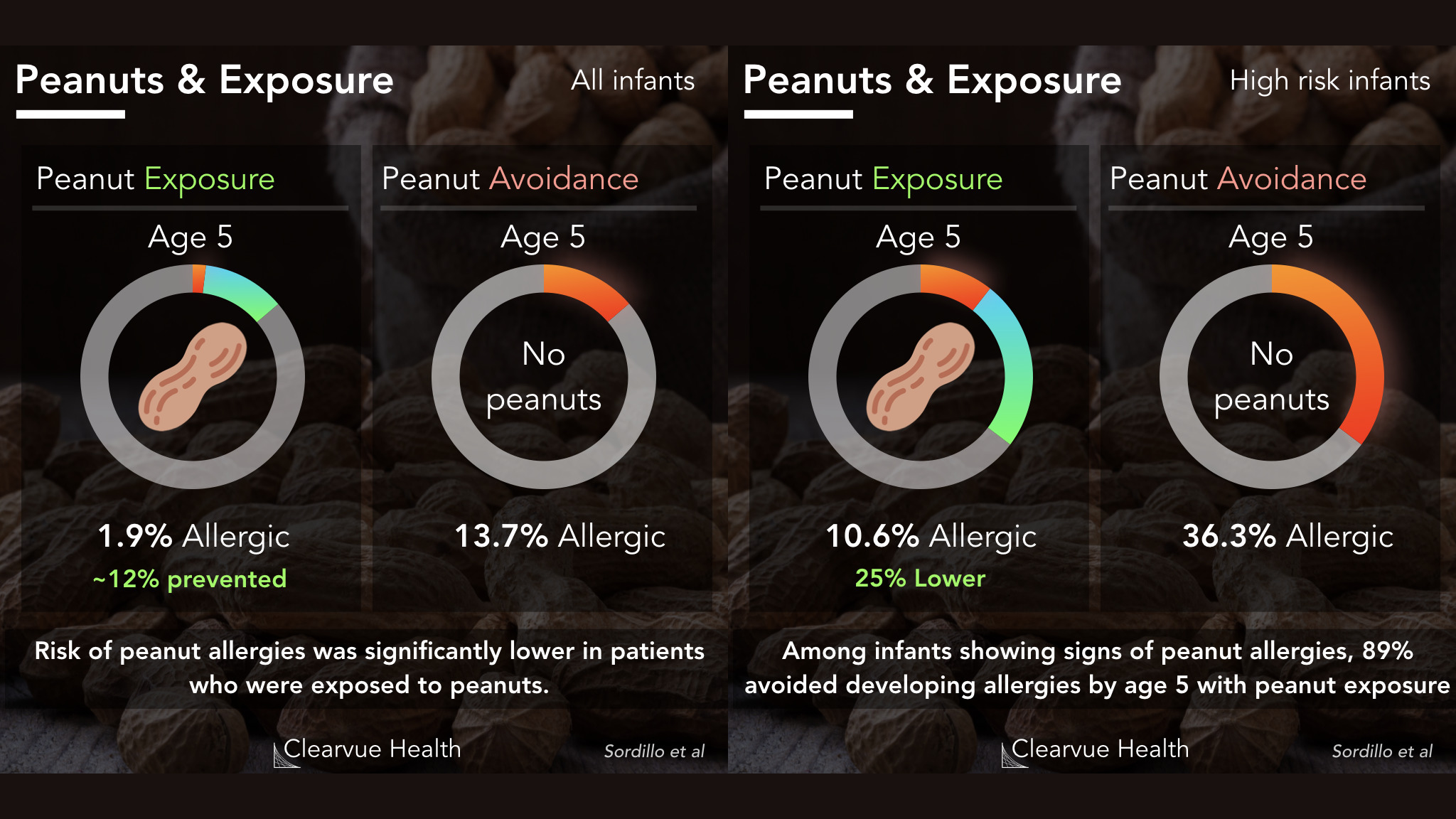does breastfeeding prevent peanut allergy
However most women are apprehensive about the safety of consuming peanuts when breastfeeding. On contrary according to the Journal of Allergy and Clinical Immunology research findings nursing mothers could help protect their babies from developing allergies by eating peanuts while they are breastfeeding.

Food Allergy Awareness Campaign And Peanut Free Giveaway Facts About Childrens Food A Food Allergies Kids Food Allergy Awareness Week Food Allergies Awareness
Good nutrition early in life can set the stage for a healthy adulthood and help children avoid a number of allergic conditions according to an updated clinical report from the American Academy of Pediatrics.

. However my approach depends on additional history. To put it simply peanuts are perfectly safe to eat while pregnant or breastfeeding as they pose no harm to the baby whatsoever unless the mother or the baby has an allergy or is sensitive to peanuts. Prevent both neural tube defects and nut.
Runny or blocked nose or sneezing. Restricting peanut while breastfeeding is not recommended as it does not prevent peanut allergy Boyce 2011Kramer 2012. 5 Tips to reduce food allergy risk in your baby Include common allergen foods in your pregnancy and breastfeeding diet.
When your baby is ready at around 6 months but not before 4 months start to introduce first foods including peanut such as smooth peanut butterpaste and well-cooked egg. Introduction of peanut In 2000 the American Academy of Pediatrics AAP published recommendations to prevent food allergy in infants at risk for allergic disease. Another expert Marc E.
Get Prescribing Info Dosing FAQs and More by Visiting the Official Patient Site. No differences were noted in infant age sex ratio breastfeeding and several other variables. See Safety Results from Clinical Studies Including Reported Adverse Reactions.
Also while breastfeeding a small part of the protein present in the peanuts may leak into the. When mothers choose to breastfeed babies can have lower risks for a number of disease conditions which may include reducing the risk of eczema a risk factor for developing food allergies. There is not a clear evidenced-based answer.
Beyond breastfeeding parents can help reduce the risk of a child developing peanut allergies through early introduction of peanut foods around 4-6 months depending on a. The question is does exposure of peanut during breastfeeding count as early exposure and do breastfeeding infants exposed to peanut in breastmilk have a lower risk of peanut allergy. If the child has reacted to personal ingestion of peanut but has not reacted to breastfeeding when mom has ingested peanut I do not have the family remove peanut from the mothers diet.
Which demonstrates that antigen avoidance diet during pregnancy and also during breastfeeding does not reduce the possibility of allergy occurrence to cows milk egg and peanuts in the first second and seventh year of life. Difficulty in breathing due to swelling of the throat. Include oily fish at least 2-3 times per week during pregnancy and whilst breastfeeding.
Delaying the introduction of the common allergy causing foods does not prevent food allergy. How can I prevent my baby from getting allergies while pregnant. Luckily during breastfeeding you do not have to stick to the strict pregnancy diet as long as you follow some rules of healthy eating.
In this context it is worth mentioning the 2014 Cochrane meta-analysis by Kramer et al. But research shows kids are better off if they eat peanut products very early in life. However there is strong evidence to show that introducing allergens to your baby starting at 4 months old can help prevent food allergies.
Mothers avoid PTN during pregnancy and breastfeeding. An itchy or raised rash hives mild swelling that can be seen on lips eyes or face. Theres no strong evidence to suggest that breastfeeding can help prevent allergies.
Peanuts are a great source of protein and many other important nutrients. Many parents think they can keep their child from getting a peanut allergy if they dont give him peanuts until he is older. Signs and symptoms of anaphylaxis include.
Feeding infants peanut products from ages 4 to 6 months may prevent them from developing a peanut allergy says Avraham. In 2015 a study showed that giving peanut products to babies could help prevent peanut allergyThis was exciting news given that 1-2 of children suffer from peanut allergy an allergy that can not only be life-threatening but last a lifetime unlike other food allergies that often improve as children get older. However if you have a child that has developed symptoms related to the foods you eat eliminating these foods from your diet may help improve your childs symptoms.
On contrary according to the Journal of Allergy and Clinical Immunology research findings nursing mothers could help protect their babies from developing allergies by eating peanuts while they are breastfeeding. The mothers of peanut-allergic infants were 23 times more likely to have consumed peanuts during breastfeeding than mothers of the control infants although peanut ingestion during pregnancy was a stronger predictor of peanut allergy12. Once the food is introduced make sure your baby eats that food at least twice.
Current research indicates that avoiding peanuts during pregnancy or breastfeeding does not help to prevent peanut allergies in your child. Best regards Daniel J. See Most Frequently Reported Adverse Reactions in Participants from a Clinical Study.
There are no recommendations to avoid any food while you are breastfeeding to prevent allergies. Excluding highly allergenic foods such as fish peanuts and eggs during breastfeeding can prevent childhood allergies to these foods. Follow me on Twitter drClaire.
Symptoms of a peanut allergy can include. Believe it or not this has not been adequately addressed nor studied in the quest to figure out the best way to reduce the risk of childhood food allergies. Peanut allergies are the most common cause of anaphylaxis which is a life-threatening allergic reaction and many schools and childcare centres have a peanut ban to prevent reactions.
The key to introducing your baby to new foods is to do so gradually. In an effort to prevent peanut allergies in children the American Academy of Pediatrics AAP briefly recommended that high-risk women avoid peanuts during pregnancy and while breastfeeding. If the mother has nut allergies children may also develop the same in most cases.
Ad Oral Immunotherapy Treatment for Reducing Peanut Sensitivity in Children. With these findings experts are hoping that peanut allergy treatments will be available to patients within 5-10 years. An updated clinical report from AAP reviews whether breastfeeding can prevent certain allergies and how early peanut feeding can help prevent a peanut allergy.
I hope this is helpful. Rothenberg MD says it still remains to be proven if the amount of peanut protein found in breast milk is sufficient. The figures suggest that 14 of children now have a peanut allergy.

How To Help Prevent Peanut Allergy In Kids Food Allergies Food Allergies Kids Kids Nutrition

Allergy Help Allergies Infographic Copd Awareness

Pin By Hannah Vejvoda On Allergies Allergies Food Allergies Food Allergy Mom Food Allergies Awareness

New Guidelines Detail Use Of Infant Safe Peanut To Prevent Allergy American Academy Of Pediatrics Prevent Allergies Allergies Severe Eczema

Mission Mightyme Peanut Allergy Puffed Severe Eczema

Mission Mightyme Proactive Peanut Puffs With Purpose Peanut Allergy Kid Friendly Meals Food Allergies

Can Feeding Your Baby Peanuts Help Prevent Food Allergies

Guidelines And Research On Preventing Peanut Allergy Managing Peanut Allergies

Peanut Allergy Treatment Exposure Therapy Visualized Health

Peanut Allergy La Leche League International

Proactive Peanut Puffs Video Video Starting Solids Baby Pediatrics Proactive

Mission Mightyme Proactive Peanut Puffs With Purpose Prevention Severe Eczema Peanut Allergy

Spoonfulone Mix Ins Food Allergies Kids Allergies Severe Eczema

Triple Exposure Protects Against Peanut Allergy Child Cohort Study

How To Feed Your Baby To Prevent Peanut Allergy

How To Read A Label For Milk Soy And Peanut Food Allergy Research And Education Food Allergies Awareness Reading Food Labels Food Allergies

Peanut Allergy Treatment Exposure Therapy Visualized Health

Ready Set Food Protect Your Baby From Food Allergies Baby Led Weaning First Foods Food Allergies Common Food Allergies
